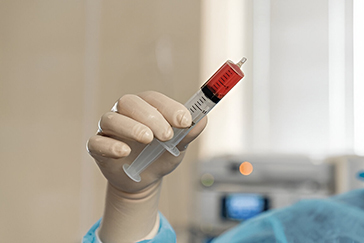 Book Appt.
Book Appt.
 Call Now
Call Now


Introduction
Myelodysplastic syndrome (also known as myelodysplasia or, more recently, myelodysplastic neoplasm) is a category of tumors that prevent your blood (haematopoietic) stem cells from developing into healthy blood cells. Without enough healthy blood cells, you risk developing dangerous illnesses such as anemia, recurrent infections, and uncontrollable bleeding. Some patients with MDS may develop acute myeloid leukemia (AML).
There are six MDS types. Healthcare experts classify the condition based on the findings of tests that reveal the quantity of healthy red and white blood cells and platelets, the number of immature blood cells or blasts, sideroblasts, and chromosomal alterations.
Symptoms
People with myelodysplastic syndromes may not exhibit signs and symptoms at first. Myelodysplastic syndromes can cause fatigue, shortness of breath, unusual paleness (pallor) caused by a low red blood cell count (anemia), easy or unusual bruising or bleeding caused by a low blood platelet count (thrombocytopenia), pinpoint-sized red spots just beneath the skin caused by bleeding (petechiae), and frequent infections caused by a low white blood cell count (leukopenia).
Causes
A healthy person's bone marrow produces new, immature blood cells that mature over time. Myelodysplastic disorders occur when this process is disrupted, preventing the blood cells from maturing. Rather than growing properly, blood cells perish in the bone marrow or shortly after entering the bloodstream. Over time, there are more immature, defective cells than healthy ones, resulting in issues such as fatigue caused by a lack of healthy red blood cells (anemia), infections caused by a lack of healthy white blood cells (leukopenia), and bleeding caused by a lack of blood-clotting platelets.
Diagnosis and Tests
If your doctor suspects you have myelodysplastic syndrome, he or she may perform a physical exam, review your medical history, and administer testing. Blood tests and bone marrow extraction for testing are two possible tests. Blood and bone marrow samples are sent to the laboratory for analysis. Specialized testing can identify the exact properties of your cells, which can aid in defining the type of myelodysplastic syndrome you have, your prognosis, and treatment options.
Treatment
Myelodysplastic syndromes are often managed to reduce disease progression, alleviate symptoms, and prevent consequences. There is no treatment for myelodysplastic syndromes; however, certain drugs can help delay the disease's course. If you have no symptoms, treatment may not be necessary immediately. Instead, your doctor may propose regular checks and lab testing to evaluate your status and determine whether the disease worsens.
Patients with myelodysplastic syndromes can get blood transfusions from healthy donors to restore red blood cells and platelets. Blood transfusions may help ease symptoms.
Medications
Treatment for myelodysplastic syndromes may include medications such as:
Increase the number of blood cells your body produces. These medications, known as growth factors, are artificial versions of chemicals found naturally in your bone marrow. Growth hormones that stimulate bone marrow to produce more red blood cells can help you avoid frequent blood transfusions. Growth factors that increase white blood cell production may lower your risk of infection.
Encourage blood cells to develop. Medications that increase the maturation of blood cells can lessen the need for frequent blood transfusions in persons who do not benefit from growth factors. Some of these medications may also lessen the likelihood that the disease may progress to leukemia.
Suppress your immune system. Certain myelodysplastic syndromes are treated with medications that suppress or regulate the immune system, reducing the requirement for red blood cell transfusions.
Assist persons with a certain genetic abnormality. If your myelodysplastic syndrome is linked to a gene mutation known as isolated del (5q), your doctor may prescribe lenalidomide (Revlimid).
Treat any infections that have occurred. If your condition creates infections, you will be treated for them.
Blood & Marrow Transplant and Cellular Therapies
A Blood & Marrow Transplant and Cellular Therapies, also known as a stem cell transplant, is the only treatment that has the potential to cure myelodysplastic disorders. However, because of the high risk of catastrophic consequences, this treatment is normally reserved for patients who are in good enough health to tolerate it. During a bone marrow transplant, heavy dosages of chemotherapy medications are utilized to remove faulty blood cells from your bone marrow. The defective bone marrow stem cells are then replaced with healthy donor cells (allogeneic transplantation).
Lifestyle and home remedies
People with certain myelodysplastic syndromes have low white blood cell counts, making them vulnerable to repeated, and often severe, infections. To reduce your risk of infection, take precautions such as washing your hands, handling food properly, and avoiding ill people.
Conclusion
Myelodysplastic syndromes are complex conditions that necessitate precise diagnosis and treatment. While the prognosis varies greatly amongst patients, continuous research and breakthroughs in treatment options provide hope for better results. Regular follow-up with healthcare experts is required to assess illness development and change treatment strategies as needed.
SHALBY Sanar International Hospitals provides extensive medical procedures backed up with our state-of-the-art technology and a team of highly qualified & experienced clinical experts.
Our doctors pen down their research findings and experiences from time to time. Their words provide deep insight into the latest techniques, technologies and other advancements in healthcare. It provides expert answers to all kinds of health questions for real-life issues.
VIEW ALL



.jpg)
Since the day of its foundation, SHALBY Sanar International Hospitals is committed to provide comprehensive healthcare services. It regularly organizes awareness programs in its premises and encourages outdoor healthcare activities and camps with an intent to put focus on preventive healthcare.
VIEW ALL